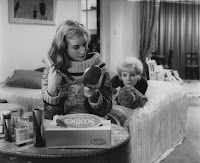Whereas, say, San Francisco's queer film festival handily runs right up to its pride march, London makes do with lots of overpriced club nights for what should be the highlight of the queer calendar. This year, however, POUT's screenings, running from 28 June to 6 July, aim to establish this missing link.
Among the films are two wonderful docs, The Times of Harvey Milk and Before Stonewall, which give a marvellous (if entirely US-focussed) overview of the origins of LGBTQ (and how many letters will be added to that billing in years to come?) activism. I heartily look forward to The Queer Years in the next decade or so.
Or maybe it's already here. Born in '68, a French film spanning 40 years or so of French Left history, although fiction, does a pretty good job of shoehorning in all the relevant touchstones of that country's recent history, running from de Gaulle to Chirac, as well as working in a precis of queer activism of the early '90s. I was struck by how similar the AIDS protests were to those held in San Francisco. And even the T-shirts were the same! This film is also screening at Frameline.
 The POUT schedule features two films programmed by Club des Femmes: The Killing of Sister George and The World Ten Times Over. Two 1960s films directed by men may be strange choices for such an event, but, as Club des Femmes' Selina Robertson explained: "We look for the alternative, we look for politics and dialogue and experimentation... This season, visiting 1960's mainstream filmmaking is a new departure for us, predominantly because for the first time we are screening work by men. But on this occasion we wanted to go back into our history and have a look at some key films from that iconic 60's decade. So we chose two films shot in London that attempted to represent contemporary lesbian lives."
The POUT schedule features two films programmed by Club des Femmes: The Killing of Sister George and The World Ten Times Over. Two 1960s films directed by men may be strange choices for such an event, but, as Club des Femmes' Selina Robertson explained: "We look for the alternative, we look for politics and dialogue and experimentation... This season, visiting 1960's mainstream filmmaking is a new departure for us, predominantly because for the first time we are screening work by men. But on this occasion we wanted to go back into our history and have a look at some key films from that iconic 60's decade. So we chose two films shot in London that attempted to represent contemporary lesbian lives."Well, I have had a look at The World Ten Times Over, and I must say it's not exactly brimming with feel-good swinging London-ness. Or feel good lesbian-ness. Two rather unhappy dancehall hostesses sharing a flat have to cope with the disapproving men in their lives as well as an unwanted pregnancy, a suicide attempt and many interesting costume changes. Are they lesbians? Well, it's a kind of blink-and-you-miss-it, coded lesbianism, very well camouflaged by their constant discussions about their boyfriends and male dates.
The London pictured here is a polarised city of executive suites and open-top cars contrasted with seedy after-hours clubs and back streets shot furtively with hand-held cameras. Quite striking but very much a period piece, with a standout performance by Sylvia Syms and an irritating one by June Ritchie as her "friend".
Robertson's take on the selection differs: "We feel that it's very important to remember where we have come from, in terms of our own British lesbian cinema culture. The two films that we have choosen to screen were made pre- and post de-criminalization. One is extremely well known and the other virtually unknown to a wider audience, so we thought it would be a good idea to have a look at these films again in a more contemporary context."
As part of the screening of Sister George, Club des Femmes is seeking reminiscences of The Gateways Club: "We want your memories! If you enjoyed the delights of the Gateways Club will you send us your memories? Who broke your heart? Who lit your cigarette? Is it time to tell all?" Tattletale should be sent to: femmes@clubdesfemmes. Should be enlightening.
No comments:
Post a Comment